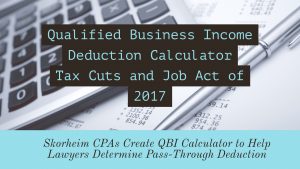By Jim Skorheim
 The Tax Cuts and Jobs Act of 2017 made expansive changes to our federal tax laws. The key tax benefit for businesses owned by individuals is the Qualified Business Income (QBI) Deduction, also known as the Pass-Through Business (PTB) Income Deduction. Taxpayers that have business interests in sole proprietorships, partnerships, LLCs, S-corporations, rental real estate, estates & trusts, REITS, publicly traded partnerships (PTPs) and farming coops can deduct up to 20% of the QBI from these PTBs. What’s more, this new deduction reduces the taxpayer’s taxable income at his or her maximum applicable tax brackets, which now reach up to 37%. The tax savings of this new small business deduction can be substantial. For instance, a single taxpayer with taxable income of $150,000 before the QBI deduction and QBI of $100,000 would save $4,800 in taxes which represents almost 16% of his or her taxes. Similarly, a married couple with twice the taxable income and QBI amounts would save $9,600 in taxes with the same almost 16% reduction in their taxes.
The Tax Cuts and Jobs Act of 2017 made expansive changes to our federal tax laws. The key tax benefit for businesses owned by individuals is the Qualified Business Income (QBI) Deduction, also known as the Pass-Through Business (PTB) Income Deduction. Taxpayers that have business interests in sole proprietorships, partnerships, LLCs, S-corporations, rental real estate, estates & trusts, REITS, publicly traded partnerships (PTPs) and farming coops can deduct up to 20% of the QBI from these PTBs. What’s more, this new deduction reduces the taxpayer’s taxable income at his or her maximum applicable tax brackets, which now reach up to 37%. The tax savings of this new small business deduction can be substantial. For instance, a single taxpayer with taxable income of $150,000 before the QBI deduction and QBI of $100,000 would save $4,800 in taxes which represents almost 16% of his or her taxes. Similarly, a married couple with twice the taxable income and QBI amounts would save $9,600 in taxes with the same almost 16% reduction in their taxes.
However, the new tax deduction calculation has been complicated by various limitations. The deduction cannot be more than 20% of the taxpayer’s taxable income (less net capital gains). In addition, the deduction can be no larger than 50% of the taxpayer’s allocable share of wages of the PTB, or 25% of such wages plus 2.5% of the taxpayer’s allocable share of unadjusted basis of depreciable property of the PTB. To complicate matters further, some high-income taxpayers may be denied the deduction if their PTB falls into various categories of specified service businesses (SSBs), such as doctors, lawyers, accountants and professional athletes. These limitations are subject to a phase-in range based on the taxpayer’s level of taxable income. Taxpayers with $157,000 or less of taxable income ($315,000 or less for a married couple) would be free of the wages limit and the SBB disallowance. Taxpayers with $207,500 or more of taxable income ($415,000 or more for a married couple) would be subject to the full wages limit and any deduction for a SSB would be disallowed in full. Taxpayers with taxable income within these ranges would have the new deduction reduced proportionately. Finally, these potential limitations are applied separately to each PTB owned by the taxpayer.
Due to the complexity in calculating this new deduction for business owners, Skorheim & Associates has developed a QBI Deduction Calculator which requires the taxpayer to enter only five (5) general inputs and an additional four (4) specific inputs for each PTB. The Calculator does the rest: it calculates the QBI deduction, applies the limitations, determines the phase-in adjustments if applicable, and adds the deduction for any qualifying REIT, PTP or Coop income of the taxpayer. The QBI Deduction Calculator is contained in a Microsoft Excel Workbook and can make the appropriate calculations for up to ten (10) PTBs of the taxpayer. The Workbook is protected so that the user only has access to the few input cells in the workbook and thus the user need not worry about making inadvertent changes to the calculation cells in the workbook. The workbook illustrates all of the necessary QBI Deduction calculations so the user can fully check the logic and math of the calculator to verify its results. You can access and download the Calculator, free of charge, at the following link.
Jim Skorheim
 Jim Skorheim is a Principal at Skorheim & Associates. He is former partner with Deloitte and Moss Adams and is a CPA, attorney, Certified Fraud Examiner, Certified Valuation Analyst, and Chartered Global Management Accountant. During Jim’s 35+ years in practice he has developed expertise in accounting and auditing, securities analysis, taxes, financial and estate planning, business valuation, business consulting, mergers & acquisitions, due diligence, corporate governance, and risk management services for both public and private companies. www.skorheim.com. Contact Jonathan Skorheim at [email protected] for more information.
Jim Skorheim is a Principal at Skorheim & Associates. He is former partner with Deloitte and Moss Adams and is a CPA, attorney, Certified Fraud Examiner, Certified Valuation Analyst, and Chartered Global Management Accountant. During Jim’s 35+ years in practice he has developed expertise in accounting and auditing, securities analysis, taxes, financial and estate planning, business valuation, business consulting, mergers & acquisitions, due diligence, corporate governance, and risk management services for both public and private companies. www.skorheim.com. Contact Jonathan Skorheim at [email protected] for more information.
You must be logged in to post a comment.